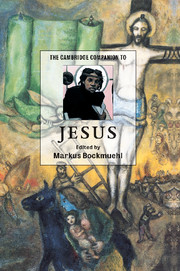2 - Jesus and his Judaism
from Part I - The Jesus of history
Published online by Cambridge University Press: 28 May 2006
Summary
THE SIGNIFICANCE OF JESUS’ JEWISHNESS
The theme of the present chapter is more pervasive than appears at first sight. Although Jesus’ Judaism seems only one among his many aspects treated in this volume, it relates to almost all of those other aspects.
Not only can the plain facts of his life be supposed to make historical sense only when seen within first-century Jewish society. More importantly, we can hope to understand how his disciples came to see him as Son of God and Messiah only if, like them, we try to interpret his life and work in the framework of Jewish history and of Jewish views of history. Jews of the period ‘read’ the events of history alongside Scripture, and the significance of particular happenings would be expressed and measured by their correspondence with the sacred verses. This was also the spiritual and historical context of Jesus and his disciples, and it is in this context that they must be understood.
Put the other way around, if we would isolate Jesus from Judaism to start with and see his relationship to it as something accidental, the relation between the historical and the theological perception of his person would of necessity become very problematic. Precisely this is what has happened during the past two centuries, as other chapters show in detail. Historical criticism sought a ‘historical Jesus’ strictly separate from the ‘kerygmatic Christ’, the subject of Christian faith. The corollary was that the subject of faith had nothing to do with human history. It seems to become clearer and clearer today that this asphyxiating dilemma is reduced to a historical problem of manageable dimensions if we start at the other end and consistently consider Jesus and his earliest believers within their Jewish context.
- Type
- Chapter
- Information
- The Cambridge Companion to Jesus , pp. 25 - 40Publisher: Cambridge University PressPrint publication year: 2001
- 1
- Cited by



